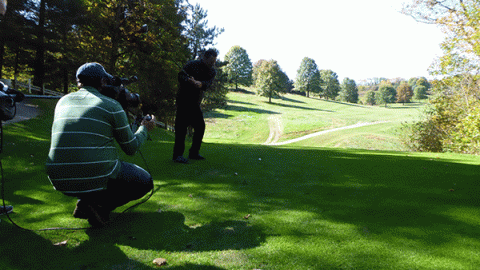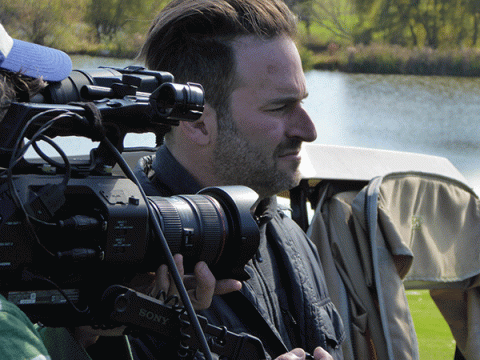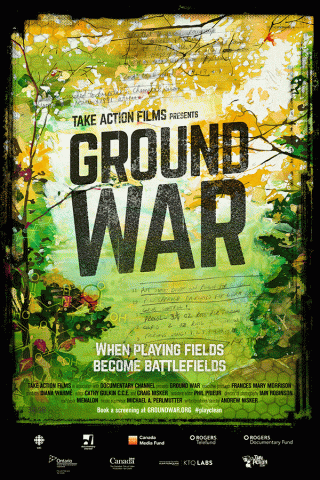
Not everyone sees beauty in a picture-perfect green lawn sprayed with pesticides or other harmful chemicals. Take Toronto filmmaker Andrew Nisker, known for his environmental docs, Garbage: The Revolution Starts At Home; Chemerical: Redefining Clean For A New Generation; and Orange Witness. His latest social cause documentary, Ground War -- set to close the Beyond Pesticides conference in New York City with a screening on April 6 -- investigates the death of Nisker's father, Harold, from non-Hodgkin's lymphoma, a form of cancer that forms in the white blood cells.
An avid sportsman and health fanatic well into his 80s, Harold Nisker left his son at a loss to explain an eventual cancer diagnosis — until Andrew recalled his father's lifelong passion for golf. And so begins a deep documentary dive into the world of pesticide use on golf courses and a wider campaign by citizen activists for child-safe school yards and playing fields in Trump-era America.
Nisker's Ground War is timely, amid pressing concerns for the use of the weed killer glyphosate, and a San Francisco federal court jury on March 27 awarding $81 million in damages to a man who alleged the popular herbicide weed killer, also known as Roundup, caused his non-Hodgkin's lymphoma. Other lawsuits are pending against Monsanto owner Bayer.
In Ground War, Nisker goes beyond questioning the value of manicured fairways and greens to revealing concerned parents and politicians backed by chemical lobbyists at battle over frontlawns, public parksand school fields that leave children at play dangerously exposed to nasty carcinogens and toxic chemicals.
The April 6 screening of Ground War will be followed by a panel discussion involving Nisker, and the former applicator of the glyphosate-based weed killer Roundup, groundskeeper Dewayne “Lee” Johnson, who features in the film and, like the late Harold Nisker, is terminally ill from non-Hodgkin's lymphoma. Tickets are available here.
Samaritanmag sat down with Andrew Nisker to talk golf, green spaces and creating a safer world for our children and their children.
The death of anyone's father is a very personal experience. How did you go from the very personal to a very public documentary that calls into question the game of golf?
Great art and music is inspired by what happens in life, to the artist. To me, it was a very personal and profound experience (to lose my father) and an experience I was not unfamiliar with. I lost my mother 27 years beforehand to cancer, too. My father wasn't a spring chicken, but when anyone gets sick, everyone has questions. They ask the doctor, do their research. And obviously I took that to a different level by making a movie because I was so moved, and so surprised, by the information I found. I never would have thought the place he loved to go and he considered his healthy place to be -- walking through fields of green and caring his bag and eating his big salad for lunch -- would be so heavily treated with pesticides, at the time.

Originally golf wasn't played in those environments. It's been chemically manicured for your enjoyment. But who's to say you can't have the same enjoyment without the chemical manicuring? It's just a different experience.
And you argue that lush, green lawn that's been sold to us in gardening magazines by chemical companies has very little beauty, if any, and could be very dangerous to our health?
That mindset, where it looks really good? No. That used to look really good to me, but not anymore. After what I now know about what it takes to make the lawn look that good, it actually looks very ugly to me. That's the idea of shattering the beauty myth, about changing our perception of what green is.
Your local golf course no doubt counters they responsibly use pesticides as a last resort, again for the convenience of patrons.
The degree and amount (of pesticides) used depends on the budget of the golf course and on the demands of the players. City courses in Toronto with lower budgets use less inputs, as they call them. And more private clubs where my father played use higher inputs. And over the years, through pressure from people who live around golf courses, and environmental organizations, the industry has definitely made a concerted effort to reduce the amount of chemicals used to let areas not heavily played to just grow and let them be. But the question remains, is it possible to do that for the whole course and still enjoy the game? When you wake up to the fact that, to get that aesthetic, you need to use chemicals, then you need to weigh whether it's worth the trouble for that aesthetic and would I still enjoy the game without pesticides and the course was different and natural.
The industry will also say the use of pesticides is regulated. So it's safe.
That's a whole other question I raise. Who's testing and who's regulating? That's where it gets murky and you see lobbying efforts and influencing public policy. And it's obvious by what's happening in the United States, where I draw the line between the inauguration ceremonies of Donald Trump and the campaign contributions of Dow Chemical towards that, and all of a sudden the work that the EPA (Environmental Protection Agency) was doing and the blowback on certain regulations concerning certain chemicals that Dow manufactures. Again, it's interesting to see those things unfold and acts being repealed that would restrict the use of these chemicals, like the Clean Water Act. So, leaving those questions aside, I ask why we need these things. And the answer is always we don't.
I assume your father never assumed his walk around a golf course in nature would threaten his health because of exposure to toxic pesticides.
He was in tremendous shape. But he never once connected the health of his environment with his health. And that's where we're in the dark and that's why I saw this exciting opportunity to raise those questions and start this conversation among golfers.
The search for a perfect fairway and green on the golf course extends to our front lawns, public parks and school playing fields. Some regions in North America have said no to chemicals for a manicured look, and others are resisting. Why?
In order to get a green landscape to follow a certain aesthetic that we're being marketed and sold. We're told we need to treat (our lawns) in a certain way and that means buying certain chemicals and using certain equipment and following a certain routine. And that fuels an entire industry. Now is the time to wake up to the damage caused when we perpetuate that green aesthetic. It's time to dial back from that. We've already done that in Ontario, restricting the use of certain pesticides in our parks, lawns and playgrounds. Kids love it. My boys have never come home and said, Dad, I don't want to play in the park, there's too many weeds. I say why can't the golf industry follow suit. But they push back and say there's a level of expectation that golfers want and this is what it takes to get there.
We should assume, in Ground War, golf is an entry point to discuss the wider issue of a global use in chemicals in our green spaces.
Certainly, the people who are most vulnerable to these chemicals are those that play the most in these places -- children. They play in parks, they play in playgrounds. So let golfers do what they want. I golf once in a while. I have nothing against the sport. If you want to smoke cigarettes, go ahead. It's your choice. But the fact is children have no choice. And municipalities should know better. So there's a war going on now between municipalities and parents that want to get rid of pesticides, because they know their communities can be just as beautiful, if not more beautiful, without them, and companies that want to continue to sell these products. And we're the gold standard, in Ontario and 80 percent of Canada, where we stopped using them and life is fine.

I thought wow, that's unbelievable. He's kind of like me, in a way. He's suing, I'm making a film, not suing anyone. But I'm also trying to raise this issue so people start talking about it. And he's trying to do it in a legal way, and having a hard time. My father wasn't working with the chemicals. But my father was also an extreme player. He played six, seven rounds a week for 40 years. So be it, but through that and learning more about what's happening in the U.S., that produced this film.
Ground War also has viewers meet Julie Taddeo, who along with her neighbors in a suburb outside Washington D.C. campaign to curb cosmetic pesticide use in their town of Takoma Park. And there's Troy Albury, a dive master in the Bahamas whose livelihood is threatened when the chemical runoff from a seafront golf resort causes coral reefs where he dives, and its sea life, to die.
The amazing thing about that story is the battle to build that resort started with documentary evidence about how healthy that coral reef was. And ten years later after it was built, you could see how building that golf course impacted the health of the reef. It's hard to make the connection between the pesticides affecting the reef, but we could see the fertilizers running off from the course and into the water and affecting the reef. It's still showing that there's a connection between chemicals running off a golf course to create an aesthetic and its impact on the environment.
Surely golf courses are different than school fields or coral reefs. If someone wants to take the risk of pesticides for a carefree round of golf, that's their choice?
It comes down to a pre-cautionary principle, and whether you want to take that risk or not. And whether you're being told about the risk you're taking. I don't think it's been as transparent as it should be. In the case of Dwayne Lee Johnson, his case was based on how well he was informed about the dangers of chemicals he was using. The jury decided that he wasn't well informed because of the information being internally circulated around the company, and what was being given to the public. He won that case. He's the Rosa Parks of the pesticide movement, the first guy to win a case, but tragically he's terminally ill with non-Hodgkin's lymphoma.
What should children at play on fields that have been sprayed with pesticides do?
It's up to the comfort level of what parents would like. You're told to wash your hands before you eat after a round of golf. Kids at the best of times don't want to wash their hands, much less after the playground. I definitely think parents should be pushing for the removal of (pesticide spraying) around areas where their children play. They must demand that those areas are free of these things. Also, these (cancers) take a long time to manifest themselves, but the most critical windows of exposure are in your childhood, at certain genetic points of your growth or the arc of your life. It alls depends on when and how the exposure may affect you.
How home and garden pesticides are marketed, especially each spring, is also a concern.
The idea of your own lawn and your own green environment was foreign until the post-war years. That's when the barrage of purchasing chemicals to control your nature came about as an industry. Along with that, came the supports you need: lawn mowers, lawn tractors, and the gardening tools. Now you could become the master of your own domain. And anything in your landscape that you couldn't control became the enemy. Here are our chemicals to get rid of the bugs, the rodents, and the weeds. You end up with a monoculture of green and that's what you're paying for every year, because everyone needs the aesthetic of that lawn. And that mentality spilt over from those that brought golf to America.
So you recommend parents, people everywhere, join environmental activists to campaign against the use of pesticides and other chemicals being used anywhere in the green space, because they just aren't needed?
It's the community's right to band together, the town council to band together, and say we don't want to use this. And they're being told that they can't make that decision, on a local level. And they're being told you don't have anything to worry about because it's been approved at the federal level.
And Ground War aims to get the message to end pesticides use everywhere out there.
This green obsession has to stop. The aesthetic of green and beauty has totally shifted. Let's make America green again, that's my Maga hat.
(Please support Samaritanmag's original journalism by making a PayPal contribution or EMT transfer using info@samaritanmag.com so we can increase the amount of content and writers we hire. Samaritanmag is the anti-tabloid, covering good people trying to change bad things. Let's make this thing bigger than TMZ.)
Nike